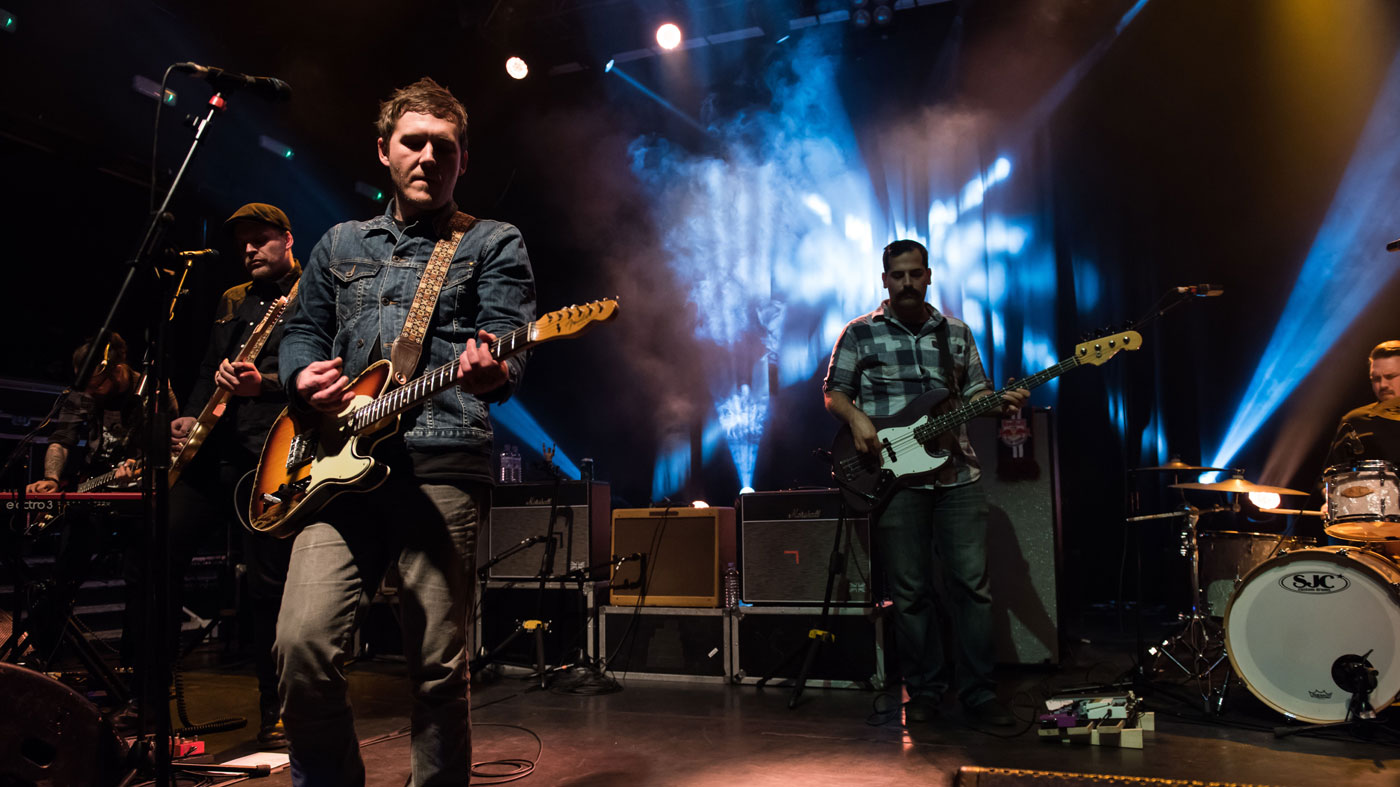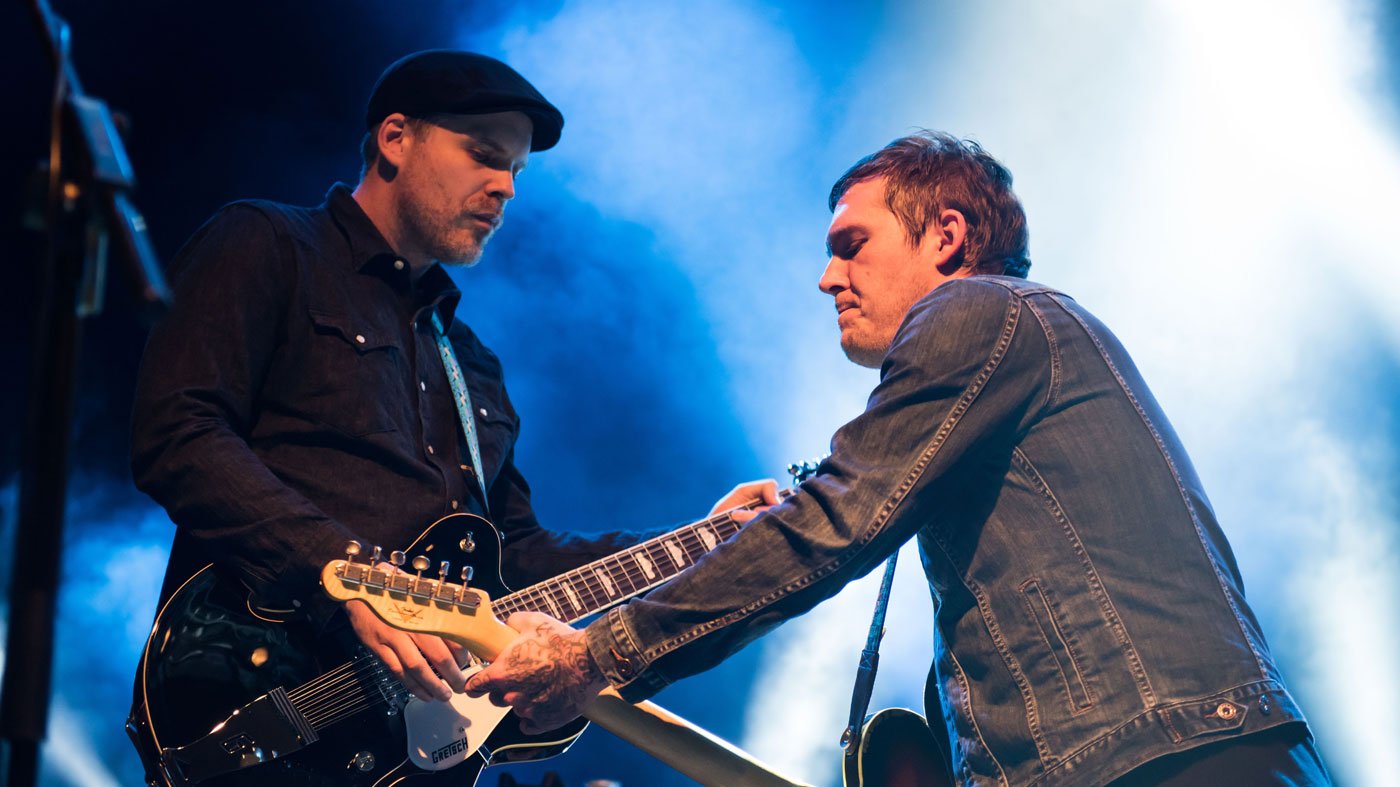Brian Fallon talks Painkillers, The Gaslight Anthem and converting to ES-335s
"Everyone needed to get away from the machine"

Introduction
The Gaslight Anthem may be on a break, but singer/guitarist Brian Fallon has returned with his first solo album, Painkillers. Here, he tells us that it was simply a case of preserving his band’s legacy and following his instinct...
It felt like early days indeed to be seeking creative rejuvenation
A fair few hearts were broken on 29 July 2015, when The Gaslight Anthem announced they would be going on hiatus after concluding that summer’s European tour. For a band that had barely been together 10 years, it felt like early days indeed to be seeking creative rejuvenation and left many questions unanswered in its wake.
Now, under a year later, singer and guitarist Brian Fallon has resurfaced with a new solo venture, Painkillers - containing 12 of the most emotionally charged and stripped-down tracks he’s written to date, delving even deeper into his love for acoustic rock.
While the new start was very much something that needed to happen, the New Jersey native is quick to point out there was never any bad blood between his old bandmates...

Keep it special
Was Gaslight’s break a group decision?
“100 per cent. We all sat down and talked about it, there wasn’t really one person who came forward to suggest it. We realised we didn’t know what to do next and that wasn’t a good thing. Gaslight had been a bit of a rollercoaster, so we decided it was maybe best to just stop, rather than making a decision we’re not happy about. Doing nothing can sometimes be more proactive than doing something and regretting it later!
Everyone needed to get away from the machine, you know?
“Before Painkillers, I was running around trying to please everyone up and down the street before myself of the band. When I just needed to do what makes me happy. That’s what people liked in the first place, the fact I wrote those songs only for me, nobody else. Everyone needed to get away from the machine, you know? Tour, record, tour, record… we needed to keep this special.”
Did you take a step back and think what kind of album this would be? Could these have been Gaslight songs?
“I generally only write for whatever project is right in front of me. I don’t have a conflict over what the music is for, like if it’s Gaslight or potentially solo stuff. I never have that problem. But whatever I write, there’s a common thread - it’s always going sound like me. I think the execution is where it became a different thing.
“Gaslight sounds like Gaslight and when it’s not that band playing, it changes. It’s like Tom Petty And The Heartbreakers versus Full Moon Fever, which is just Tom Petty solo. Did it really sound that different? Probably not. It’s not like I’m getting away from rock music. I have no secret desire to do a hip-hop record!”

Butch sounds
Nobody Wins feels quite revealing - “I lost most of myself pleasing everyone, I had to learn how to begin again, It’s alright, move on” - is that a fair representation of where you are right now, creatively-speaking?
It’s like really soft, easy listening death metal!
“It should, I wrote it just for that… and purely for myself. There’s an expression that goes: ‘between you, me, Jesus and the dead’ which means basically nobody. That’s what I went back to. That’s why I sing ‘Hallelujah, nobody wins!’ It’s me saying I’m cool with all of it. There are songs on this record that wouldn’t have sounded the same at all if Gaslight recorded them. That’s what made it okay for me, I guess.”
It’s strangely heavy in some ways for an album so soft, perhaps because a lot of instruments feel like they have been pushed into the red…
“It’s like really soft, easy listening death metal! The volumes were pushed to the limit and clipping, there were real mics and real instruments driven right up to the point where it almost starts to sound bad. I thought it sounded awesome, and just so loud.
“There wasn’t much studio trickery going on. Butch Walker, the producer, is just a master at getting great sounds straight off the bat, and also a great songwriter that’s done all sorts of pop records with Fall Out Boy, Frank Turner, Taylor Swift, everybody…”

Getting the balance
So what’s the key to delicately balancing all these instruments in one song?
“It’s a matter of using everything as colour and not just filling space. Don’t be afraid of empty space in songs - it’s okay! Me and Butch played most of the instruments you hear, apart from a session drummer and pedal steel guy.
In the last couple of years, if I’ve learned anything it’s don’t think too much!
“It was all very planned, we had the time to look at things and think, ‘Oh, this could do with a banjo on the chorus to keep it moving!’ We didn’t add too much, though the one thing we did double was the acoustics… like Tom Petty and Traveling Wilburys! We’d record a six-string and then a 12-string on top of it to get some bigger sounds. Some of the leads are me, some are Butch - we even traded off Iron Maiden-style on a few songs.”
Long Drives really stands out to us for its country-influenced Americana… how did that track come together?
“On the demo, the verses of that song were completely different. They were more like a Gaslight song, so when we made it Butch suggested writing something really different and Americana-influenced for the verses. I rewrote it that night, came back the next day and was really pleased with how it came out. It was that easy.
“In the last couple of years, if I’ve learned anything it’s don’t think too much! A friend of ours called Josh played pedal steel, he was working in the studio next door and came down to record some parts for us. And as for the banjo you hear on the other tracks, that’s Butch playing. I’m from New Jersey… and there ain’t no banjos in New Jersey. I’ve checked!”

Semi-hollow tones
Was there a particular acoustic guitar that you gravitated to for the recording sessions on this album?
“I wrote almost the entire record on my Martin D-41 acoustic. Other than a Gibson J-45, which I wrote the beginning of the record on, everything was done on that Martin. We had all these vintage guitars at our disposal and the Martin always sounded better.
I switched to a 335 and I finally felt like I had something to show for my 20 years of playing!
“I have a lot of guitars and I’m not bitten by the whole vintage thing. Some of it sounds cool and some of it sounds like utter garbage! There are old Les Pauls from 1960 that sound awful. They are not all prized gems. You have to be careful, there are definitely new Les Pauls that have come out that sound just as good as the old ones. And we know, we tested them side-by-side!”
Did you gravitate to semi-hollows for the electric tones?
“I usually use a ES-335, 345 or 355 hollowbody Gibson. The second I get them, the pickups come out and I switch in some Lollar Imperials, Bare Knuckle Mules or Stormy Mondays. Those are the only pickups I use. I used to be a single coil guy and only play Teles. But after a while I felt like they were fighting a little bit.
“I got to a limit with my abilities and felt like I was having the same old issues and not getting any better. I switched to a 335 and suddenly I could do stuff that I never had before. I finally felt like I had something to show for my 20 years of playing! I was fingerpicking, playing slide solos, tapping things, legato stuff like Jimi Hendrix. I can get a 345 to sound like a Tele by using the Varitone switch in position three, it’s easy.”

Experimenting
It often feels like some players forget how much control they have using just the basic features found on any common guitar…
“Guitar players don’t seem to know their instrument these days, no one seems to understand how your tone or volume controls work. What happens between four and 10 is wildly different, you should change it during the course of a song.
People don’t experiment enough, they’re too busy buying new gear
“People don’t experiment enough, they’re too busy buying new gear thinking it will make them sound like Eddie Van Halen. Good players sound the same whatever they play, look at Jimi Hendrix using a Les Paul… it still sounded like Jimi!”
And it looks like you’re using your Pelham Blue Gibson ES-335 again?
“I’ve never told anyone this… here’s what happened. My Pelham Blue 335 had a twist in the actual wood of the neck. We took it to the head of Gibson’s Custom shop and he’d never seen anything like it. One day the wood warped and twisted, and it was just gone, shredded, not able to be fixed.
“So the one I’m using now came after two years of waiting around, when they put out this limited edition 2015 Memphis Custom Shop model. It’s not like the real expensive one. I try to buy the off the shelf stuff, I don’t need all the Custom Shop stuff. If it sounds good, then cool. Rip the pickups out and get some Bare Knuckle Mules in there… It took me a while to go back to Pelham Blue, I was scared the same thing might happen, but now I’ve got four of them!”

Four horsemen
We also noticed you’ve been using a Pete Cornish SS-3 overdrive. If they’re good enough for Gallagher and Gilmour…
“Noel is actually the reason I ended up playing 355s. I started out with 335s but thought his looked cooler with the Custom shop logo. And he’s got a killer sound live, so I checked out his rig and saw a Cornish SS-3. And seriously, they’re the best pedals I’ve played in my life… what they do is insane.
That’s the beauty of it, I can do whatever I want with a day’s notice and get people to play different parts!
“There’s a buffer in there, so if you have a lot of pedals, it runs through that before anything to clean and brighten it up. Even when the pedal’s off, the buffer is still running in there. It does something weird to the tone, but in the best way possible.
“It makes a Klon look like kid’s stuff. I don’t wanna hear that sound anymore, I can hear it on every record. It’s a bit like the Tube Screamer! The only person I want to hear playing a Tube Screamer is Stevie Ray Vaughan.”
Your band has played with four guitarists on stage. Has that ever felt excessive?
“It’s not like there’s four of us all the time, for every song... during the set, people switch around between keys or Gretsches or 12-strings. I’m the only constant electric guitar player, until we get to the acoustic songs. It’s not just loads of guitars going for it, there is a method to the madness. But yes, it does look daunting visually and we are addressing that! [laughs].
“We’re trying to figure out what works live on the next tour and throughout the year we’ll be fixing and changing things. That’s the beauty of it, I can do whatever I want with a day’s notice and get people to play different parts!”

Familiar faces
There’s a few familiar faces from Gaslight lending a hand on stage and on the record…
The only rule is we can’t have the four of us playing together unless it was Gaslight
“Alex [Rosamilia, lead guitarist] played piano on the album and Ian [Perkins, touring guitarist] is on there too. There’s no bad blood, it was a little easier because we all had a sense of maturity about the whole thing. It was what needed to happen. Everyone was excited for me to be doing it, why wouldn’t they be? If one of those guys was working on something, I’d want to do the same!
“The only rule is we can’t have the four of us playing together unless it was Gaslight… because that would be crazy. As for the future, who knows. None of us want Gaslight to put out a sucky album, we’d rather not do it. If it’s something we can be proud of, then we’ll absolutely be back!”
Brian Fallon’s debut solo album, Painkillers, is out now on Island Records
Amit has been writing for titles like Total Guitar, MusicRadar and Guitar World for over a decade and counts Richie Kotzen, Guthrie Govan and Jeff Beck among his primary influences. He's interviewed everyone from Ozzy Osbourne and Lemmy to Slash and Jimmy Page, and once even traded solos with a member of Slayer on a track released internationally. As a session guitarist, he's played alongside members of Judas Priest and Uriah Heep in London ensemble Metalworks, as well as handling lead guitars for legends like Glen Matlock (Sex Pistols, The Faces) and Stu Hamm (Steve Vai, Joe Satriani, G3).


